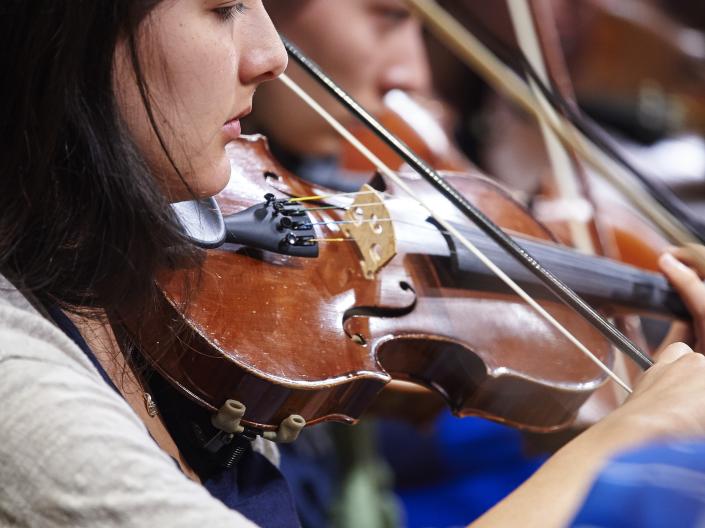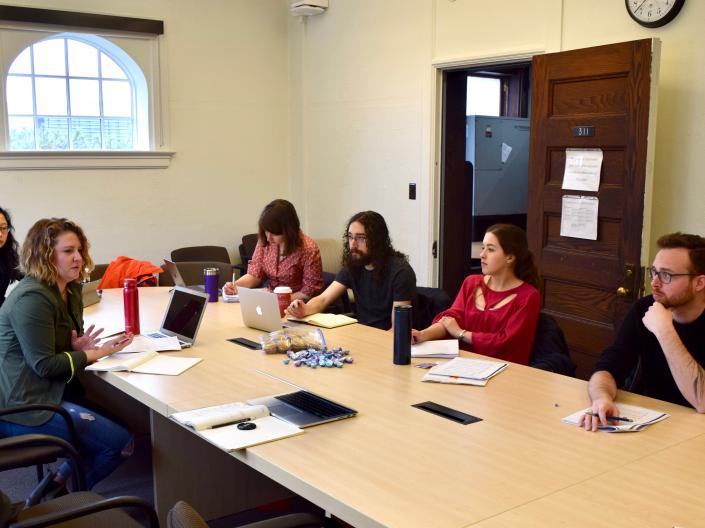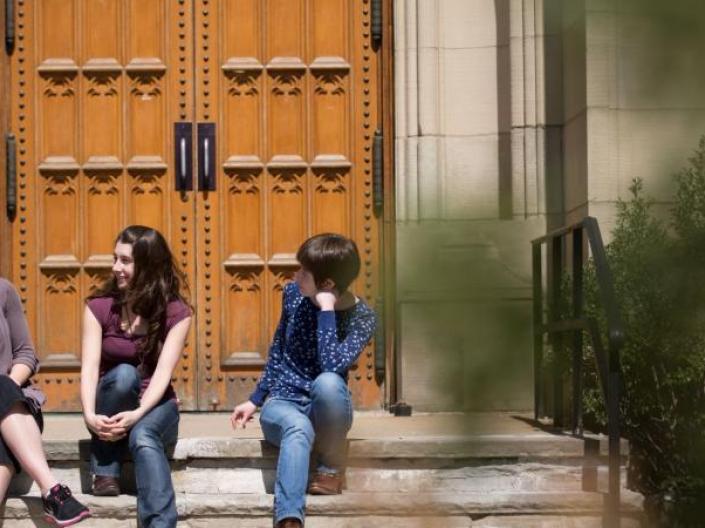We’re here to support your musical and academic journey. Whether you're planning your course of study, seeking performance opportunities, or looking for technical or administrative assistance, the links below will help you find the information you need.
If you don't see your question addressed here, please contact us.
Frequently Asked Questions
Yes! The Department of Music is pleased to offer a variety of traditional and contemporary music ensembles to students from all academic disciplines, as well as to University Circle community members.
Additionally, there are several music-based student clubs to explore, including those focused on vocal or instrumental performance, cultural music, musical theatre, athletic bands, arts and media, academics, and service.
For more information, visit:
Yes, the Department of Music is committed to offering undergraduate student employment opportunities that provide valuable work and educational experience. These roles allow the department to benefit from the talents, insight, and enthusiasm of our students.
For more information, please find job descriptions and the employment application on the Student Employment page.
Borrowing an Instrument: The Department of Music has an inventory of instruments available for students to use in ensembles and special circumstances.
Transporting Equipment: Department of Music property is not available for public use or external events off-campus. If you need to use equipment for a campus event, authorization from the music office is required.
For more information, visit:
Yes, music majors with piano as their primary instrument fulfill their primary ensemble requirement through Keyboard Ensemble. Additionally, pianists may participate in bands, orchestras, choirs, chamber music, or specialty/small groups as secondary ensembles.
The Cleveland Orchestra (TCO) performs at Severance Hall, located in the heart of the CWRU campus. Many TCO members serve as faculty at CIM and provide lessons to CWRU students. Music majors are eligible to receive a free Frequent Fan Card through a lottery process, allowing them to attend TCO concerts at no cost.
Through the Student Advantage Program, all students can enjoy TCO concerts for just $15 per ticket, with even greater savings available by upgrading to a Frequent Fan Card. Sign up and reserve the best available seats each Monday before a concert—it’s free to join!
Additionally, music majors in the Joint Music Program have the unique opportunity to attend select rehearsals and master classes offered by TCO throughout the academic year.
Current Student Auditions
If you are a current CWRU student interested in adding a music major, you may request an in-person audition before your second semester.
To get started:
- Contact the Coordinator of Undergraduate Studies below to request an audition.
- Music Education (BS): Dr. Ryan Scherber
- Music (BA): Dr. Benjamin Helton
- Submit the Current Student Audition Form to confirm your interest.
- Prepare materials for your primary instrument or voice using the Audition Information.
- Auditions are held on Reading Days of the current term, with times provided in advance.
You can arrange recording sessions or services in Harkness Chapel (fees apply), or borrow various portable audio recorders and video cameras for self-recording.
The Department of Music provides free recording services for the following events:
- Concerts by official Department of Music ensembles
- Recitals required for the completion of graduate degrees (HPP) and Capstone projects
- All endowed recitals (e.g., Ronis Recital, Concerto Competition)
- Performances by JMP chamber music courses that are offered exclusively to CWRU students (studio recitals not included)
For more information, visit:
Portable Recording Devices
Portable audio recorders and video cameras are available for CWRU students, faculty, and staff to reserve at no cost. Users are responsible for transferring, editing, and uploading their own files. To reserve a device, please email Ken Wendt at musictech@case.edu or visit the The Core Mac Computer Lab (Haydn Hall, Room 16).
After-hours access to Haydn Hall and Denison Hall is automatically provided to music majors and renews each academic year until graduation. For ensemble members (MUEN) or students taking lessons (MUAP), access begins on the Monday after the fall semester's drop/add period and expires at the end of the academic year. Access will also end if there is a change in status or position, discontinuation of enrollment in ensembles or lessons, or separation from the university.
To enter buildings after hours, use your student ID card to swipe in at the designated access points.
For more information, visit:
Room reservations are granted based on availability and confirmed on a priority basis, with preference given to music majors and faculty. While every effort is made to fulfill your first choice, the Department of Music reserves the right to adjust space assignments to accommodate as many requests as possible. Space can be provided for activities as availability allows.
For more information, visit:
Whether you’re new on campus and need to digitally notate music, or you're retired and looking to integrate technology in your lifestyle, The Core–a Macintosh computer classroom/lab dedicated to mind, sound, and vision–is a collaborative space available to all CWRU and CIM students, faculty, staff, and the University Circle community. Additionally, you can borrow personal recording devices and other IT equipment for free.
To learn more or to reserve equipment in advance, visit:
University Technology, [U]Tech
For technical support, the [U]Tech Service Desk provides unlimited, complimentary assistance.
The University Registrar provides support for students, faculty, staff, departments, and schools in all activities and systems related to the registration process. You can find detailed information on how and when to register, as well as available classes, on the Registration and Classes page.
For any specific questions or concerns, it's always a good idea to meet with your faculty advisor.
Secondary Applied Music Lessons (MUAP 131 or MUAP 531):
All current CWRU students have the opportunity to take private lessons for academic credit through the Joint Music Program, taught by Cleveland Institute of Music faculty members. Please note that a Secondary Lessons Policies and Pre-Registration Form is required for music minors and non-majors before each registration period to agree to the terms and conditions of secondary lessons (MUAP 131 or MUAP 531). Instructional fees apply.
Group Music Classes for Beginners (MUSP 100):
This course is designed for undergraduate non-music majors with little or no prior musical experience who are seeking instruction in piano, voice, or guitar. The classes are taught by Cleveland Institute of Music instructors and offered through the Joint Music Program.
For more information, visit:
The Department of Music offers lockers in a variety of sizes to store instruments, auxiliary equipment, and academic materials. To reserve a locker, please review the policies and apply on the Lockers and Borrowing Instruments page.
Our undergraduate music program typically enrolls 65–85 majors, with an incoming class of 20–25 students, plus around 25 music minors and about 50 graduate students. Small class sizes ensure a personalized experience with practical applications tailored to each student’s area of study. We also teach students from the Cleveland Institute of Music (CIM) and many non-music majors participating in lessons and ensembles.
CampusGroups (community.case.edu) is CWRU's community engagement platform, supported by the Division of Student Affairs and available for students, staff, and faculty.
With CampusGroups, you can:
- Browse the campus-wide calendar and find events you'd like to attend
- Discover groups and organizations based on your interests
- Track your involvement across groups, registered events, submitted forms, and more
For more details, visit:
The Event Planning Guide provides step-by-step instructions for preparing programs and publicizing a performance or event.
Learn more about the policies addressing discrimination and sexual harassment, as well as the support available for faculty, students, employees, and third parties:
Our network of libraries provides extensive support for community members in their scholarly pursuits, offering texts, scores, technology, and ample study spaces.
- Explore CWRU libraries
- Kulas Music Collection (Kelvin Smith Library)
- Robinson Music Library (Cleveland Institute of Music)
University Health & Counseling Services are now located in the Dental Research Building at 2124 Cornell Road.
- Health Services: 1st floor
- Counseling Services: 2nd floor
Note: As of April 1, 2024, the ground floor entrance to the Dental Research Building will be closed due to construction. Please enter through the Nursing Research Building and take the elevators to the 1st floor.
Students can make appointments at myhealthconnect.case.edu.
For more information, visit the UH+CS Page.
University Technology ([U]Tech) offers a range of student resources for Canvas on their website, including a quick overview and video tutorials.
For more information, visit:
To view your profile, you can access the online directory. If you need to make updates, please email Ken Wendt at musictech@case.edu or visit The Core (Haydn Hall, 16).
Practice rooms in Haydn Hall and Denison Hall are available to Department of Music students, faculty, staff, and music minors or non-majors enrolled in applied lessons (MUAP) or ensembles (MUEN). These rooms are not open to the public.
- Denison Hall: 6 practice modules and a percussion studio
- Haydn Hall (2nd Floor): 4 practice rooms with grand pianos
- Haydn Hall (Lower Level): 2 Historical Perf Prac (HPP) studios
For more information, please visit the Rooms and Reservations page.
Elroy John Kulas and his wife, Fynette H. Kulas, were Cleveland philanthropists who focused their giving on college and university music programs in northeast Ohio. Mr. Kulas, who passed away in 1952, was an executive in the steel industry. Having no children, the couple established the Kulas Foundation in 1937 to organize their charitable giving. Many music schools and departments in the region, including Oberlin, Baldwin Wallace, CWRU, and CIM, have benefitted from their generosity, with Kulas halls, libraries, and professorships named in their honor. The Foundation continues to be a vital supporter of music in our region.
The Department of Music maintains the Kulas Collection of Historical Instruments, which includes modern reproductions of period instruments such as Renaissance, Medieval/Baroque strings, winds, brass, and percussion instruments. This extensive collection is available to all students in the Historical Performance Practice (HPP) program and those participating in related ensembles. The program also features French, Italian, and German harpsichords, a continuo organ, and two fortepianos for students specializing in historical keyboards. For more information, please contact Julie Andrijeski, Head of Historical Performance Practice.
The Kulas Music Collection is located on the first floor of the Kelvin Smith Library and contains over 40,000 items, including books, scores, media, microforms, and music periodicals. Users can borrow books and scores, and there are designated areas for listening to media and accessing reference collections. In addition to print resources, the collection also provides access to various online databases.




